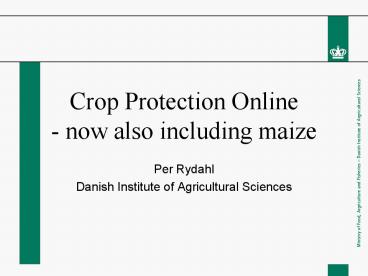Crop Protection Online now also including maize - PowerPoint PPT Presentation
1 / 28
Title:
Crop Protection Online now also including maize
Description:
Crop Protection Online - now also including maize. Per Rydahl ... Synergism. Antagonism. ED70. Herbicide A. ED70. Herbicide B. Herbicide B: Sp 1. Dose. Herbicide A ... – PowerPoint PPT presentation
Number of Views:64
Avg rating:3.0/5.0
Title: Crop Protection Online now also including maize
1
Crop Protection Online - now also including maize
- Per Rydahl
- Danish Institute of Agricultural Sciences
2
Contents
- Status
- Introduction to model
- Prototypes in maize
- User interfaces
3
Status
4
Status (1)
- Crops
- 3 spring cereal crops
- 4 winter cereal crops
- spring- and winter oilseed rape
- field pea
- sugar beet
5
Status (2)
- Herbicides
- all registered and marketed products
- Weeds
- 75 species
- Subscribers in Denmark
- 1000 farmers
- 300 consultants
- 200 schools, companies etc.
- System export
- Estonia, Latvia, Lithuania, Poland and Norway
6
Introduction to model
7
Model function
- assesses the level of weed control needed
- selects single herbicides and calculates doses
needed - calculates tank-mixtures, optimised for cost or
TFI - strategy-module for multiple treatments
8
Step 1 The level of control needed
- Includes aspects on yield, quality and crop
rotation - Based on expert knowledge
- Input
- Crop name
- Season
- Expected yield
- Weed name
- Weed density
- Output
- level of control needed on weed biomass,4-6
weeks after a herbicide application (0-97)
9
Step 2 dose-response function1 herbicide, 1 weed
1/4 N 1/2 N 1/1 N 2/1 N
10
Step 2 dose-response functionIntegration
11
Step 2 dose-response function1 herbicide, 3
weed species
12
Step 3 Tankmixtures Additive Dose Model (ADM)
Herbicide A
Herbicide B
13
Step 3 Tankmixtures Optimization
Dose Herbicide B
Sp 1
Dose Herbicide A
14
Prototypes in maize
15
Tasks
- to develop and validate DSS models for weed
control in maize - to achieve sufficient and safe control of weeds
- to quantify potentials
16
Reuse of components from cereals
- target effect levels
- expert model
- dose/response functions
- weed species (field data)
- weed growth stages (semifield data)
- temperature, relative air humidity and water
stress (semifield data) - ADM (semifield data)
17
Reuse of components from sugar beet
- strategy
- spray subsequent flushes of emerged weeds
- repeated
- field inspections
- consultations of model
- sprayings, as recommend by model
- dose/response functions
- data from genuine split-applications of single
herbicides
18
Prototypes
- 3 prototypes with 3 levels of aimed efficacy
- 90-version
- 85-version
- 80-version
- questions to answer in field validation tests
- can treatment options be recommended by model?
- is yield and weed control at satisfactory levels?
- can input of herbicides be reduced?
19
Efficacy 4-6 weeks after treatment
20
Efficacy at harvest (1)
21
Efficacy at harvest (2)
22
Yields
) No significant differences between treatments
23
Treatment Frequency Index (TFI)
24
Costs of herbicides
25
Conclusions on prototypes in maize
- considerable variation in weed infestations in
validation test plots - satisfactory weed control was achieved by all
prototypes in all tests - input of herbicides by 85-version and
80-version - about 10 reduction of TFI
- about 20 reduction of cost (about 160 DKK/ha)
- slightly revised 80-version will be integrated
in the official version of CPO in 2006
26
User interfaces
27
User interface - input www.planteinfo.dk
28
User interface - output































